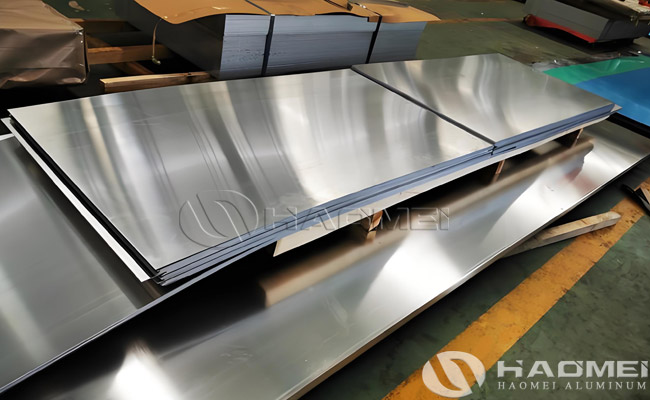Soft aluminum sheet is a metal sheet with aluminum as its main component, possessing a high aluminum content (e.g., 1000 series aluminum sheets reach over 99%). It exhibits good plasticity, ease of processing and forming, and excellent electrical and thermal conductivity, as well as corrosion resistance. Common grades include 1050, 1060, 1100, 3003, and 5052, and it is widely used in electronics, electrical engineering, architectural decoration, chemical equipment, automotive, and shipbuilding industries.

1000 series soft aluminum sheets (e.g., 1050, 1060, 1100)
Purity: Aluminum content is as high as 99% or more, representing industrial pure aluminum.
Properties: Excellent electrical and thermal conductivity, strong corrosion resistance, and easy formation of a dense oxide film on the surface; good plasticity, easy to process and form (e.g., stamping, stretching), but lower strength, unsuitable for load-bearing structures.
Applications: Electronics (capacitors, wires), architectural decoration (interior and exterior decorative panels, ceilings), reflective materials (lighting reflectors), chemical equipment (corrosion-resistant containers, pipe linings).
3000 series soft aluminum sheets (e.g., 3003, 3004)
Alloying Elements: Manganese is the main alloying element, with a content of 1.0%-1.5%.
Properties: Approximately 20% higher strength than 1-series sheets, strong resistance to atmospheric corrosion, excellent formability (suitable for deep drawing and stretching), and good weldability.
Applications: Kitchenware (pots, bowls, basins), household appliances (refrigerator evaporators), building materials (roofing panels, awnings), chemical containers (storage tanks, transport tanks).
5000 series soft aluminum sheets (e.g., 5052, 5083)
Alloying Elements: Magnesium is the main alloying element, with a content of 3%-5%.
Properties: High strength (approaching or exceeding that of mild steel), strong resistance to seawater corrosion, excellent weldability, and work hardening properties that can further enhance strength through processing.
Applications: Shipbuilding (ship plates, decks), automotive industry (body panels, fuel tanks), pressure vessels (liquefied gas tanks), military applications (armor plates, military bridges).
Soft aluminum sheets can be processed into various shapes to meet different application needs:
– Stamping:
Applying pressure to the sheet material using a die to induce plastic deformation and form the desired shape (e.g., electronic component housings, automotive parts).
– Stretching:
Stretching the sheet material to the required thickness and length using a stretching machine, commonly used to manufacture thin-walled containers (e.g., can lids, chemical storage tanks).
– Bending:
Bending the sheet material to specific angles using a bending machine for creating structural components (e.g., architectural trim strips, equipment supports).
– Anodizing:
Forming an oxide film on the sheet material surface using an electrochemical method, improving corrosion resistance and wear resistance, while also allowing for coloring to achieve decorative effects (e.g., electronic product housings, lighting accessories).
Application scenarios of soft aluminum sheet:
– Electrical and electronic fields:
Utilizing the high conductivity of 1000 series aluminum sheets, capacitors, wires, transformer components, etc., are manufactured to ensure efficient signal transmission.
3000 series aluminum sheets are used in refrigerator evaporators, leveraging their corrosion resistance and formability to adapt to complex condensation environments.
– Architectural decoration field:
1000 series aluminum sheets, used as interior and exterior decorative panels, offer excellent corrosion resistance and ease of processing, allowing for the customization of complex shapes (such as irregularly shaped ceilings and wall decorations).
5000 series aluminum sheets are used in curtain wall structures, combining high strength and seawater corrosion resistance, making them suitable for coastal buildings.
– Chemical equipment field:
1000 series aluminum sheets are used to manufacture corrosion-resistant containers and pipe linings, resisting acid and alkali corrosion and extending equipment life.
5000 series aluminum sheets are used in liquefied gas tanks, utilizing their high strength and weldability to ensure safe storage and transportation.
– Automotive and marine fields:
5000 series aluminum sheets are used as body panels and fuel tank materials, reducing vehicle weight and improving fuel efficiency; their seawater corrosion resistance also makes them suitable for shipbuilding.
3000 series aluminum sheets are used in components such as automotive wiper arms, utilizing their formability and atmospheric corrosion resistance to adapt to outdoor environments.
The hardness or softness of aluminum sheets is mainly related to their alloy composition and heat treatment state. The annealed state (O state) is the softest; this means that after annealing, the internal stress of the aluminum is released, the grains become coarse, and the material becomes very soft and easy to process. When selecting aluminum sheets, if a softer material is required, annealed aluminum sheets can be selected.
Contact Us
- 1103, No.14 Waihuan Road, CBD,Zhengzhou, China
- +86-0371-65621391
- nydia@aluminumhm.com
- Contact Form

